人教新课标高中英语必修一unit5课件2
文档属性
| 名称 | 人教新课标高中英语必修一unit5课件2 | 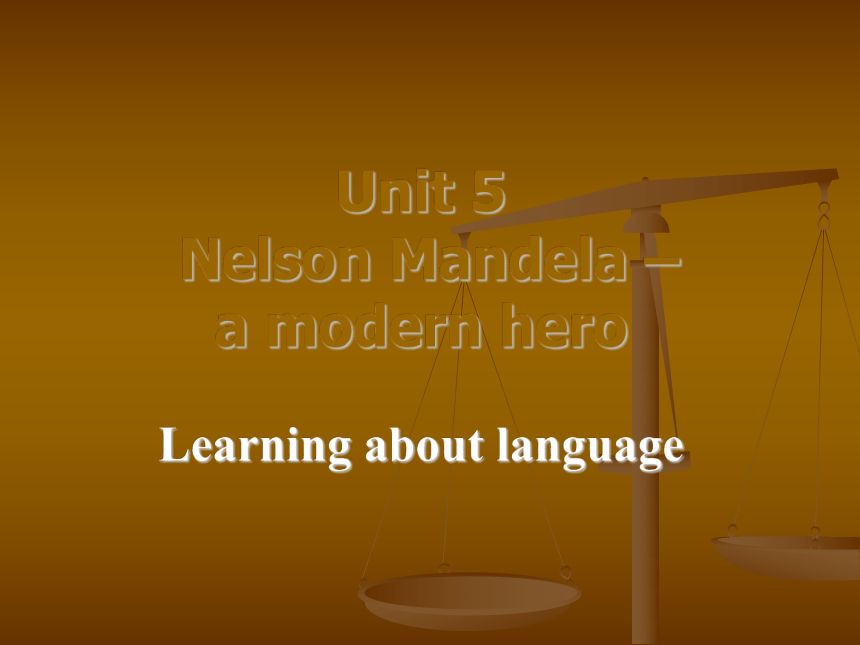 | |
| 格式 | zip | ||
| 文件大小 | 651.7KB | ||
| 资源类型 | 教案 | ||
| 版本资源 | 人教版(新课程标准) | ||
| 科目 | 英语 | ||
| 更新时间 | 2013-12-05 21:38:53 | ||
图片预览

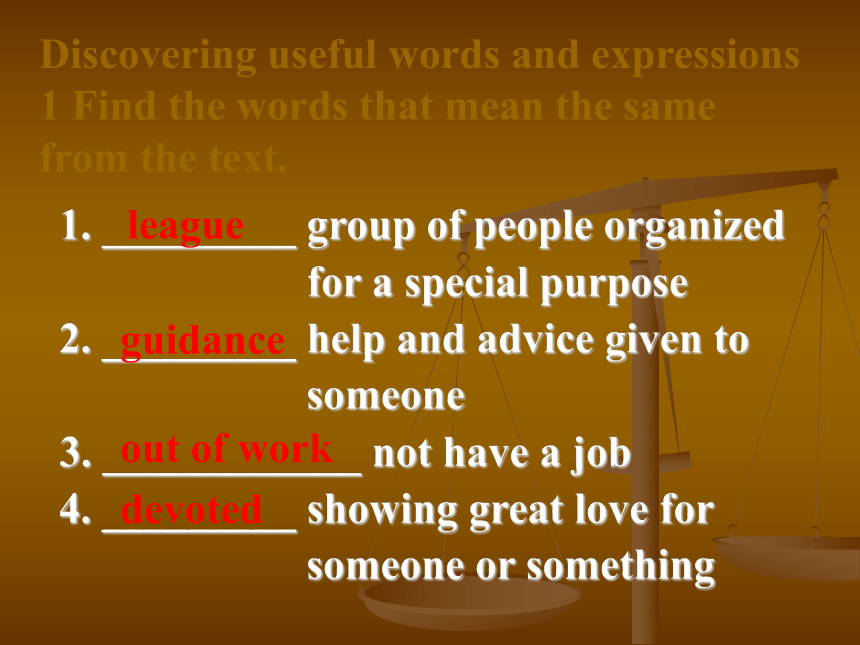
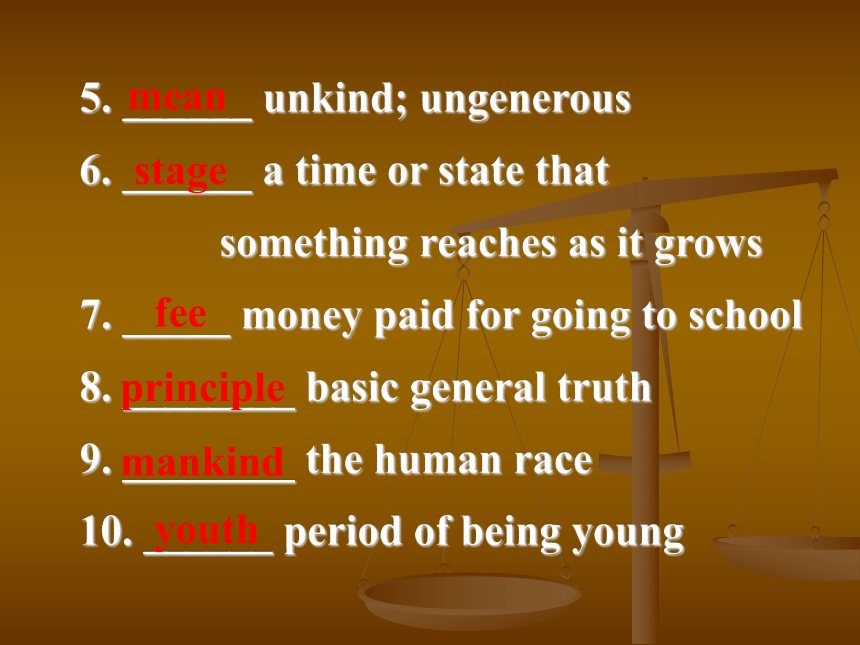
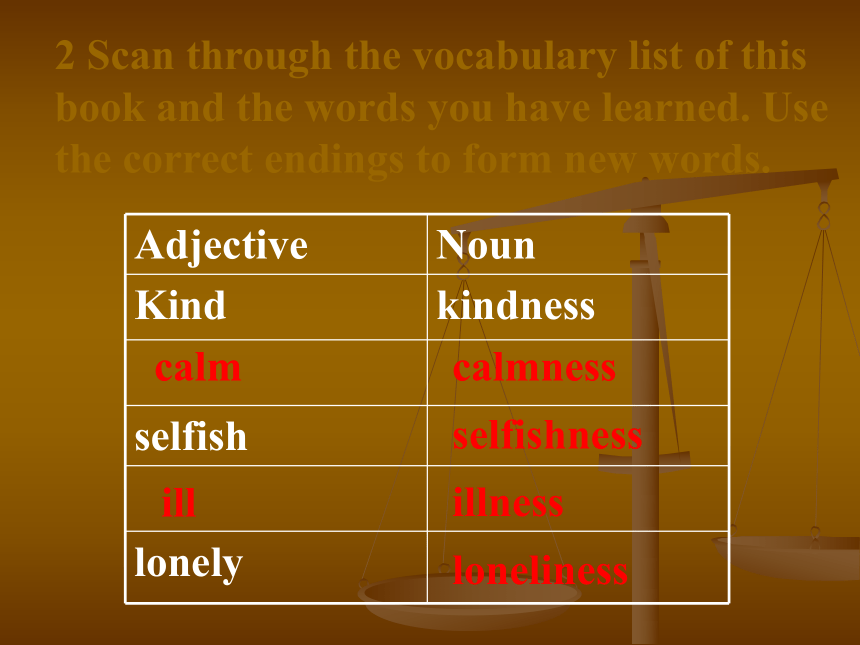
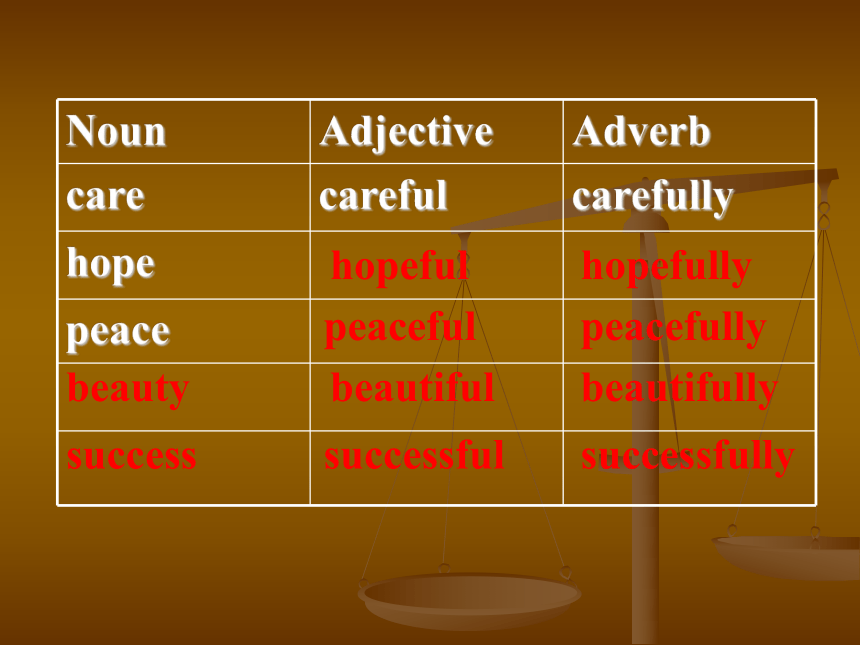
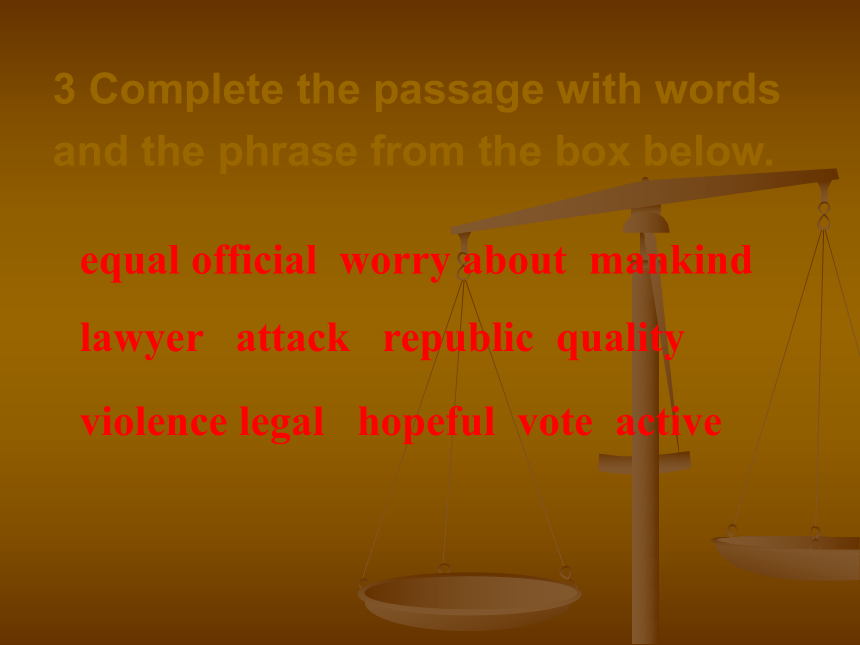
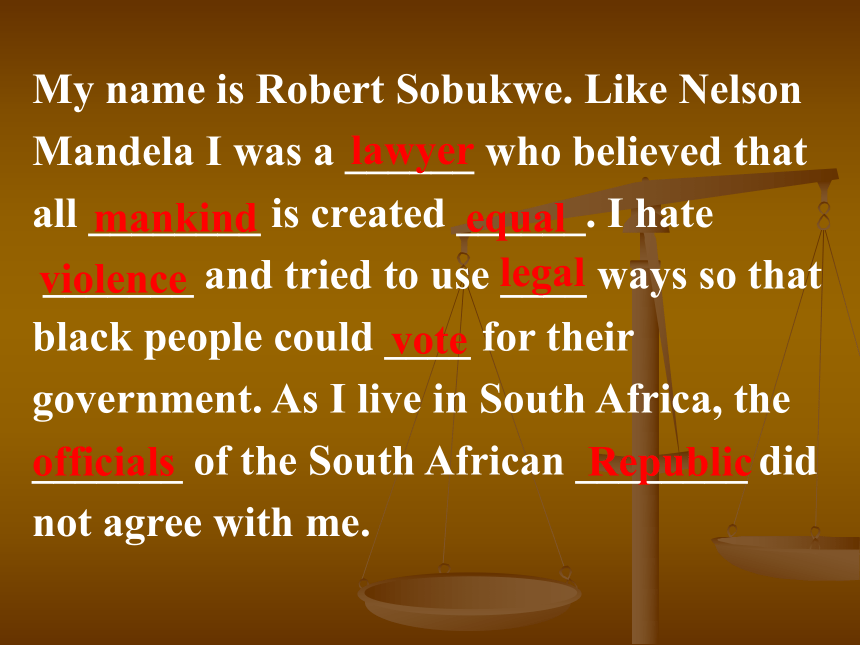
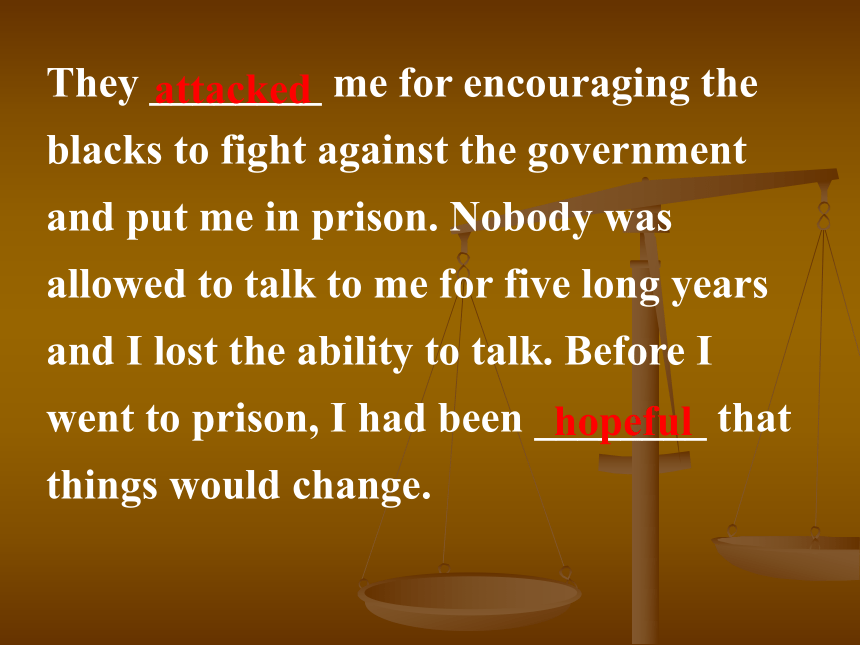
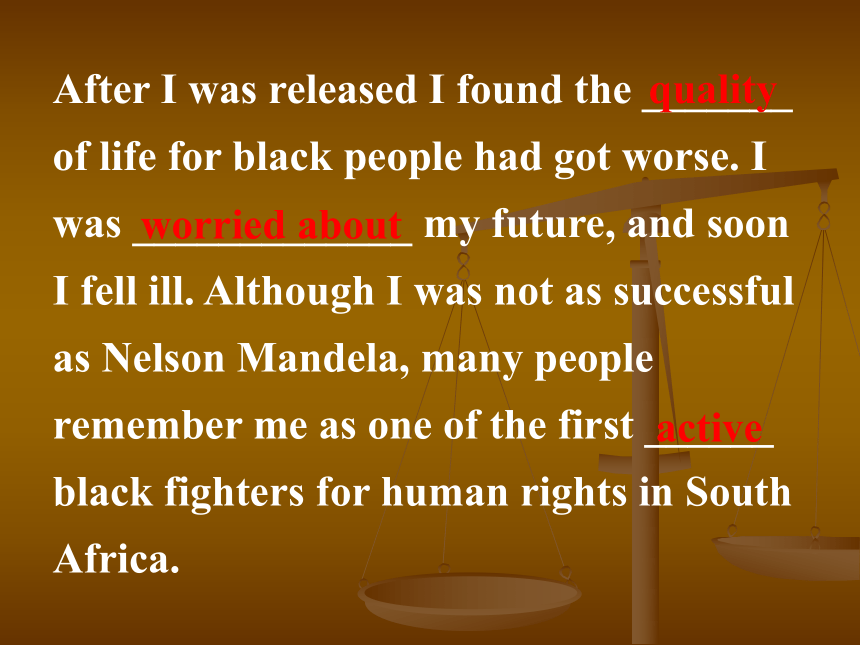
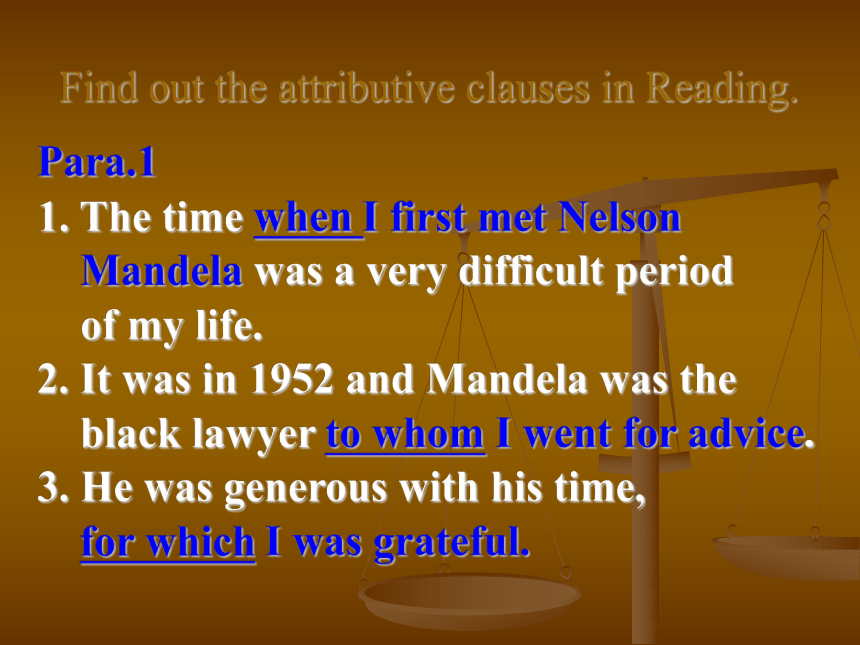
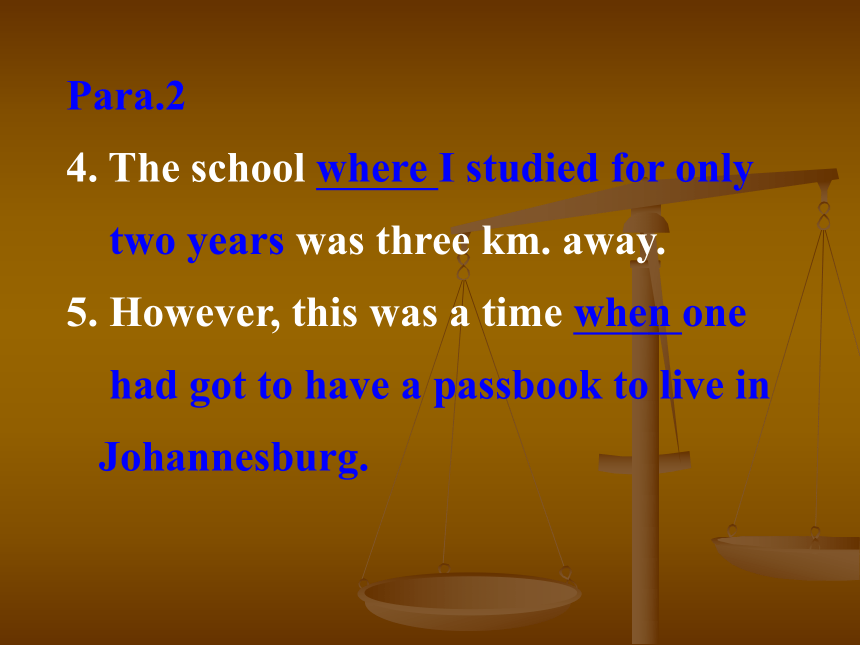
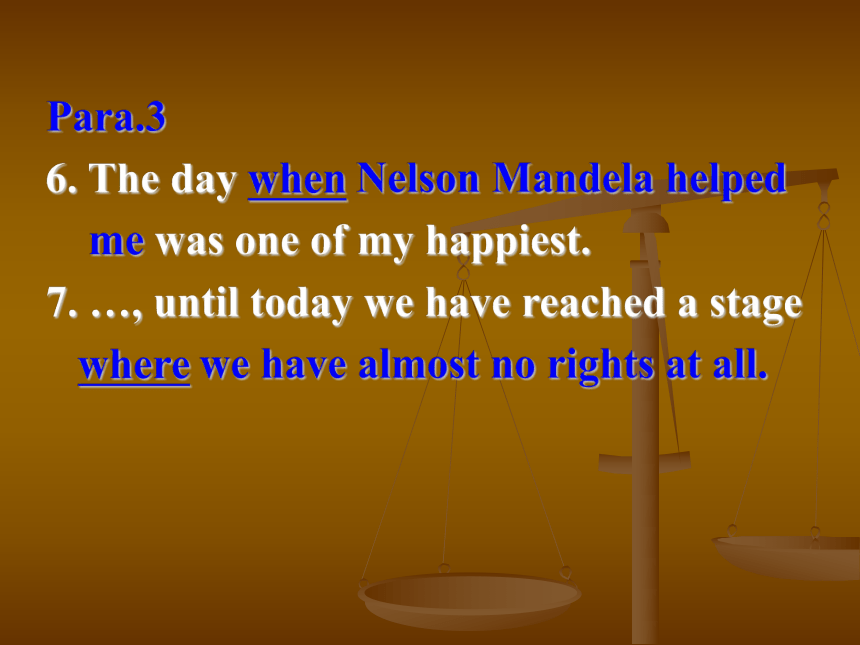
文档简介
课件38张PPT。Unit 5
Nelson Mandela –
a modern hero
Learning about languageDiscovering useful words and expressions
1 Find the words that mean the same
from the text. 1. _________ group of people organized
for a special purpose
2. _________ help and advice given to
someone
3. ____________ not have a job
4. _________ showing great love for
someone or somethingleagueguidanceout of workdevoted5. ______ unkind; ungenerous
6. ______ a time or state that
something reaches as it grows
7. _____ money paid for going to school
8. ________ basic general truth
9. ________ the human race
10. ______ period of being youngstagefeeprinciplemankindyouthmeancalmcalmnessselfishnessillillnessloneliness2 Scan through the vocabulary list of this book and the words you have learned. Use the correct endings to form new words. hopefulpeacefulbeautysuccesshopefullypeacefullybeautifulbeautifullysuccessfulsuccessfullyequal official worry about mankind lawyer attack republic quality violence legal hopeful vote active 3 Complete the passage with words
and the phrase from the box below. My name is Robert Sobukwe. Like Nelson
Mandela I was a ______ who believed that
all ________ is created ______. I hate
_______ and tried to use ____ ways so that
black people could ____ for their
government. As I live in South Africa, the
_______ of the South African ________ did
not agree with me. lawyermankindequalviolencelegalvoteofficialsRepublicThey ________ me for encouraging the
blacks to fight against the government
and put me in prison. Nobody was
allowed to talk to me for five long years
and I lost the ability to talk. Before I
went to prison, I had been ________ that
things would change. hopefulattackedAfter I was released I found the _______
of life for black people had got worse. I
was _____________ my future, and soon
I fell ill. Although I was not as successful
as Nelson Mandela, many people
remember me as one of the first ______
black fighters for human rights in South
Africa.qualityworried aboutactiveFind out the attributive clauses in Reading.Para.1
1. The time when I first met Nelson
Mandela was a very difficult period
of my life.
2. It was in 1952 and Mandela was the
black lawyer to whom I went for advice.
3. He was generous with his time,
for which I was grateful.Para.2
4. The school where I studied for only
two years was three km. away.
5. However, this was a time when one
had got to have a passbook to live in
Johannesburg.Para.3
6. The day when Nelson Mandela helped
me was one of my happiest.
7. …, until today we have reached a stage
where we have almost no rights at all.Para.4
8. They could not get the job they wanted.
9. The parts of town in which they had to
live were decided by white people.
10. The places outside the towns where
they were sent to live were the poorest
parts of South Africa.11. We were put into a position in which
we had either to accept we were less
important, or fight the government.
12. We first broke the law in a way
which was peaceful.1. The mines where I worked were 9 km
from my home.
2. The reason why I got a job was because
of my hard work.
3. The time when I arrived was late at night.
4. The government building where we voted
was very tall.
5. The date when I joined the ANC Youth
League was the 5th of August.Answer key to exercise 2 on page 37 The person with whom I lived was
a good friend of mine.
2. The house in which I was staying was
far away from my work.
3. The company for which I worked was
founded five years ago.Answer key to exercise 3 on page 374. The address to which all my letters
were sent was in South Africa.
5. The team for which I did research is
the best in China.
6. The scientist from whom the
government heard the bad news never
lost heart when he was in trouble.Grammar The Attributive Clause Ⅱ 定语从句定语从句(Attributive Clauses)在句中做定语,修饰一个名词或代词,被修饰的名词,词组或代词即先行词。定语从句通常出现在先行词之后,由关系词(关系代词或关系副词)引出。Yao Ming is a Chinese player who
was born in Shanghai. Earthquake is a sudden shaking of
the earth’s surface which may cause
great damage. I like a girl who/that
looks happy
TomThe baby whom Tom is looking after
is his brother.His brotherThis is the factory. I worked in the factory ten years ago.
This is the factory where I worked ten years ago.
The school is near a park. My son studies in this school.
The school where my studies is near a park.关系副词whereWe visited the house. Luxun once lived in the house.
We visited the house where Luxun once lived.They’ll never forget July 1. Hong Kong returned to its motherland on July 1.
They’ll never forget July 1 when Hong Kong returned to its motherland.
The days are gone forever. We used foreign oil during those days.
The days when we used foreign oil are gone forever.关系副词whenThere was a time. The businessman lost heart at that time.
There was a time when the businessman lost heart.
when引导的定语从句修饰表示时间的名词,并在定语从句中作时间状语,相当于“介词+关系代词(which)”。I’ll never forget the day when I joined the league.on which(=on the day)=We still remembered the days when we travelled together.in which(=in the days)=where引导的定语从句修饰表示地点的名词, 并在定语从句中作地点状语, 相当于“介词+ 关系代词(which)”。This is the house where I lived two years ago.in which (=in the house)=That isn’t the hotel at which she stayed
when she was in London.
at which= at the hotelThat isn’t the hotel where she stayed when she was in London.There are many reasons why people like traveling.
for the reasons =why
I don’t like the way that you speak.
in the way =that
关系副词实际上是介词+先行词关系副词whytime修饰时间place修饰地点reason修饰原因介词加 which,怎样确定介词
1. This is the factory in which he worked 5 years ago.
This is the farm on which he worked 5 years ago.
介词由先行词确定
2. Tom is my close friend from which I often borrow money.
Tom is my close friend to which I often lend money.
介词由动词决定总结 关系副词: where, when, why时间 when = in / at / on / during which
地点 where = at/in/on which
原因 why = for which“when” means “at that time”,
“where” means “at that place”,
“why” is used after the word “reason”. Homework Thank you
Nelson Mandela –
a modern hero
Learning about languageDiscovering useful words and expressions
1 Find the words that mean the same
from the text. 1. _________ group of people organized
for a special purpose
2. _________ help and advice given to
someone
3. ____________ not have a job
4. _________ showing great love for
someone or somethingleagueguidanceout of workdevoted5. ______ unkind; ungenerous
6. ______ a time or state that
something reaches as it grows
7. _____ money paid for going to school
8. ________ basic general truth
9. ________ the human race
10. ______ period of being youngstagefeeprinciplemankindyouthmeancalmcalmnessselfishnessillillnessloneliness2 Scan through the vocabulary list of this book and the words you have learned. Use the correct endings to form new words. hopefulpeacefulbeautysuccesshopefullypeacefullybeautifulbeautifullysuccessfulsuccessfullyequal official worry about mankind lawyer attack republic quality violence legal hopeful vote active 3 Complete the passage with words
and the phrase from the box below. My name is Robert Sobukwe. Like Nelson
Mandela I was a ______ who believed that
all ________ is created ______. I hate
_______ and tried to use ____ ways so that
black people could ____ for their
government. As I live in South Africa, the
_______ of the South African ________ did
not agree with me. lawyermankindequalviolencelegalvoteofficialsRepublicThey ________ me for encouraging the
blacks to fight against the government
and put me in prison. Nobody was
allowed to talk to me for five long years
and I lost the ability to talk. Before I
went to prison, I had been ________ that
things would change. hopefulattackedAfter I was released I found the _______
of life for black people had got worse. I
was _____________ my future, and soon
I fell ill. Although I was not as successful
as Nelson Mandela, many people
remember me as one of the first ______
black fighters for human rights in South
Africa.qualityworried aboutactiveFind out the attributive clauses in Reading.Para.1
1. The time when I first met Nelson
Mandela was a very difficult period
of my life.
2. It was in 1952 and Mandela was the
black lawyer to whom I went for advice.
3. He was generous with his time,
for which I was grateful.Para.2
4. The school where I studied for only
two years was three km. away.
5. However, this was a time when one
had got to have a passbook to live in
Johannesburg.Para.3
6. The day when Nelson Mandela helped
me was one of my happiest.
7. …, until today we have reached a stage
where we have almost no rights at all.Para.4
8. They could not get the job they wanted.
9. The parts of town in which they had to
live were decided by white people.
10. The places outside the towns where
they were sent to live were the poorest
parts of South Africa.11. We were put into a position in which
we had either to accept we were less
important, or fight the government.
12. We first broke the law in a way
which was peaceful.1. The mines where I worked were 9 km
from my home.
2. The reason why I got a job was because
of my hard work.
3. The time when I arrived was late at night.
4. The government building where we voted
was very tall.
5. The date when I joined the ANC Youth
League was the 5th of August.Answer key to exercise 2 on page 37 The person with whom I lived was
a good friend of mine.
2. The house in which I was staying was
far away from my work.
3. The company for which I worked was
founded five years ago.Answer key to exercise 3 on page 374. The address to which all my letters
were sent was in South Africa.
5. The team for which I did research is
the best in China.
6. The scientist from whom the
government heard the bad news never
lost heart when he was in trouble.Grammar The Attributive Clause Ⅱ 定语从句定语从句(Attributive Clauses)在句中做定语,修饰一个名词或代词,被修饰的名词,词组或代词即先行词。定语从句通常出现在先行词之后,由关系词(关系代词或关系副词)引出。Yao Ming is a Chinese player who
was born in Shanghai. Earthquake is a sudden shaking of
the earth’s surface which may cause
great damage. I like a girl who/that
looks happy
TomThe baby whom Tom is looking after
is his brother.His brotherThis is the factory. I worked in the factory ten years ago.
This is the factory where I worked ten years ago.
The school is near a park. My son studies in this school.
The school where my studies is near a park.关系副词whereWe visited the house. Luxun once lived in the house.
We visited the house where Luxun once lived.They’ll never forget July 1. Hong Kong returned to its motherland on July 1.
They’ll never forget July 1 when Hong Kong returned to its motherland.
The days are gone forever. We used foreign oil during those days.
The days when we used foreign oil are gone forever.关系副词whenThere was a time. The businessman lost heart at that time.
There was a time when the businessman lost heart.
when引导的定语从句修饰表示时间的名词,并在定语从句中作时间状语,相当于“介词+关系代词(which)”。I’ll never forget the day when I joined the league.on which(=on the day)=We still remembered the days when we travelled together.in which(=in the days)=where引导的定语从句修饰表示地点的名词, 并在定语从句中作地点状语, 相当于“介词+ 关系代词(which)”。This is the house where I lived two years ago.in which (=in the house)=That isn’t the hotel at which she stayed
when she was in London.
at which= at the hotelThat isn’t the hotel where she stayed when she was in London.There are many reasons why people like traveling.
for the reasons =why
I don’t like the way that you speak.
in the way =that
关系副词实际上是介词+先行词关系副词whytime修饰时间place修饰地点reason修饰原因介词加 which,怎样确定介词
1. This is the factory in which he worked 5 years ago.
This is the farm on which he worked 5 years ago.
介词由先行词确定
2. Tom is my close friend from which I often borrow money.
Tom is my close friend to which I often lend money.
介词由动词决定总结 关系副词: where, when, why时间 when = in / at / on / during which
地点 where = at/in/on which
原因 why = for which“when” means “at that time”,
“where” means “at that place”,
“why” is used after the word “reason”. Homework Thank you
